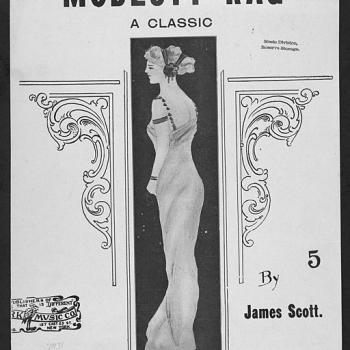I have been thinking about feminism and Catholicism recently. First, a disclaimer: I have, for a long time, thought of myself as a feminist, if only in the sense of the old bumper sticker “Feminism is the radical notion that women are people.” I was happy to wear a “This is what a feminist looks like” t-shirt on International Women’s Day. My feminist credentials have been challenged from time to time because of my pro-life views, and I am dismayed by the way in which feminism (in the U.S.) has focused heavily on abortion rights, but organizations such as Feminists for Life showed that I was not alone.
My recent ruminations started after reading and commenting on the recent post by my fellow blogger Pentimento on “Sola Skirtura” and Sexual Woundedness. Reading about this “controversy” (really a tempest in a conservative teapot) was eye opening: I knew that many conservative Catholics had “old-fashioned” notions of gender roles, but I had never had any idea that there were Catholics who were so openly misogynist. Further, in my reading, particularly of commboxes, I was dismayed by the way in which “feminism” and “feminist” were casually tossed around as pejoratives. Obviously, there are branches of feminism that are completely estranged from Catholicism; but there are also thoughtful and faithful feminists as well, and there is much room for dialog.
But this weekend I was quite dismayed by a column in my local Catholic paper: Donald DeMarco, an adjunct faculty member at Holy Apostle’s Seminary, devoted his semi-regular column to “A time-traveler’s review of feminism.” Reflecting on a taped interview of Betty Friedan from 1973, he comes to the conclusion that feminism was a failure and a “dangerous illusion.” You can read his whole column, but it can be quickly summarized as:
- Betty Friedan launched the women’s movement, whose main accomplishment was Roe vs. Wade.
- Betty Friedan was a Marxist and her ideas are to be denigrated because they are Marxist.
- Feminism promised to redefine gender roles and free masculinity from its ties with violence. Football players and football in general are really violent, so feminism failed.
- Betty Friedan had a failed marriage (because she was a Marxist).
- Betty Friedan had an abrasive personality.
- Women wanting to “control their own bodies” were talking nonsense since no one can stop the aging process.
This argument, or rather the lack of any meaningful argument, is risible: the column consists of nothing more than ad hominem attacks, logical non sequiturs and guilt by association.
While the proximate cause of this post, I am less interested in this particular essay by DeMarco (though happy to discuss it in the commboxes) than I am in the general phenomenon it represents: a fear and loathing of “feminism” that seems to b directed, not at the complexities of feminist discourse today, but rather at some construct that bears only passing resemblance to it. What lies at the root of such a visceral response? I want to suggest that Zizek’s analysis of ideology can provide some insight. I began explicating his ideas in an earlier post; here I want to continue. Zizek has argued that to understand the functioning of ANY ideological system, you need to understand its “libidinal economy”: the unconscious enjoyment and fulfillment that an ideological system attempts to provide. (It is important to note that any ideology functions on two levels: the rational—Zizek would say “in the symbolic order”—and on an unconscious level.) An ideological system is adopted and held because it provides a full explanation of who we are, both as individuals and as members of a society. The problem, however, is that no ideology can provide a complete explanation: there is a “gap”, something that cannot be encapsulated in the ideology. (Zizek refers to it as the “real.”) Thus the very strength of an ideology—that it provides an overarching explanation of the way things are—is also its weakness since any such explanation will fall short.
On the unconscious level this is intolerable, and on the rational level this translates into an attempt by the ideology to explain its own failure. It does so (or at least it often does so) by positing the existence of some “other” who is preventing the ideology from being implemented and providing the promised wholeness. In Zizek’s terms, the “other” has stolen our jouissance. (This is a term taken from Lacanian psychoanalysis and refers to enjoyment. It is closely linked to sexual enjoyment and orgasms. The key idea is that it is not rational/conscious enjoyment or happiness.) For Zizek, the classic example of the “other” is the role of the Jews in Nazi Germany. The ideological construct of “the Jew” in Nazism bore very little relationship to the actual German Jews—indeed many if not most of the people who accepted this construct as “fact” had probably never met a Jew. The libidinal function of this construct was to explain away the failure of the ideology by showing why Germany and the German people had not attained their inherent and rightful greatness: “the Jews” were poisoning their society from within. If they were eliminated, Germany and the Germans would regain their wholeness.
A similar phenomenon seems to be at work with conservative Catholics and feminism. Even a cursory reading of their work shows that they believe something has gone wrong with the Church. Though they do not reject Vatican II (except for the small minority who are in schism with SSPX or the sedevacantists) they believe that something has gone terribly wrong with the Church since then. To be fair, a number of them attempt to deal with the complexities of the Church since then. However, many (perhaps more) finding that their vision of the church and the world is unrealized, and attempting to rationalize the gap between what is and what ought to be (the inevitable gap in any ideological system) must find someone to blame. A convenient target are the “feminists”. Like the “Jews” in Nazi Germany, these “feminists” are a caricature and a construct, built from stereotypes and half-truths and bearing little or no resemblance to most (or even any) self-identified feminists, particularly Catholic feminists. This construct exists not to identify an opponent to challenge or to enter into dialog with, but as an external focus for an unconscious sense of anger and loss.
An major gap in Zizek’s work is any discussion of how such constructs should be dealt with. He argues that since they serve a libidinal need, they cannot be dealt with rationally: you cannot eliminate antisemitism (or in this case, anti-feminism) by carefully explaining why various stereotypes are false. Zizek’s argument implies that blogging about this is not an effective response: I will be preaching to the choir, since those who are invested in these particular ideological fantasies will not be swayed by brilliant arguments to the contrary (let alone by my more meager efforts).
Zizek does not, however, offer any suggestion as to how they can be addressed. In fact, in at least some places he seems to imply that they cannot be addressed or eliminated except by extirpating the ideology that holds them, root and branch. (See, for instance, his discussions about “universal partisan truth.”) This is turn is closely linked to his fascination with revolutionary violence, an approach I reject. A third option would be to address it through community and fellowship. The community of believers (which oddly enough, Zizek praises) would seem to be the ideal place to address the fear and the lack which underlies ideological constructs. But given the Church’s continued descent into tribalism (reflected in the divisions within the blogosphere), I sometimes feel at a loss as to where to begin.











